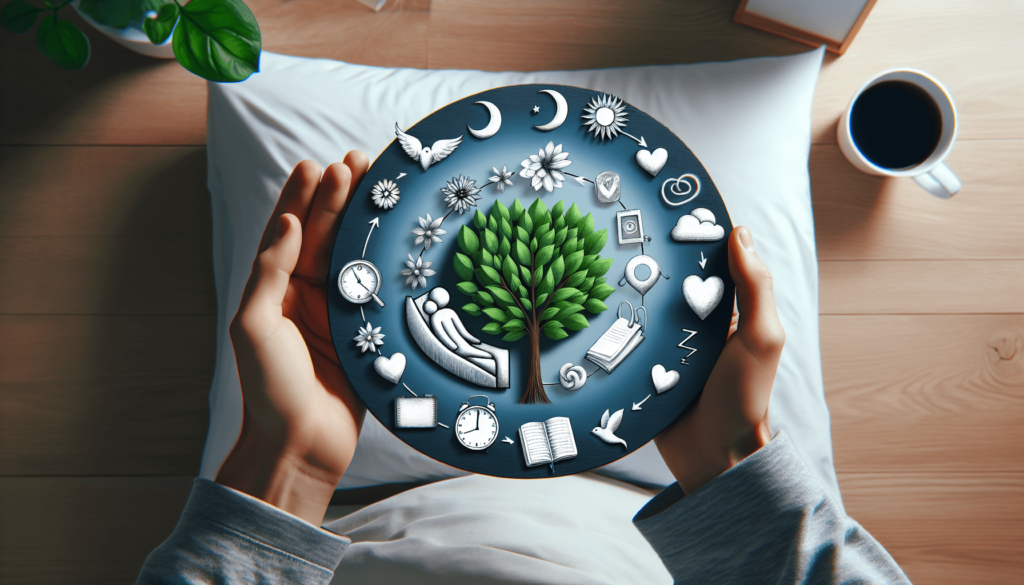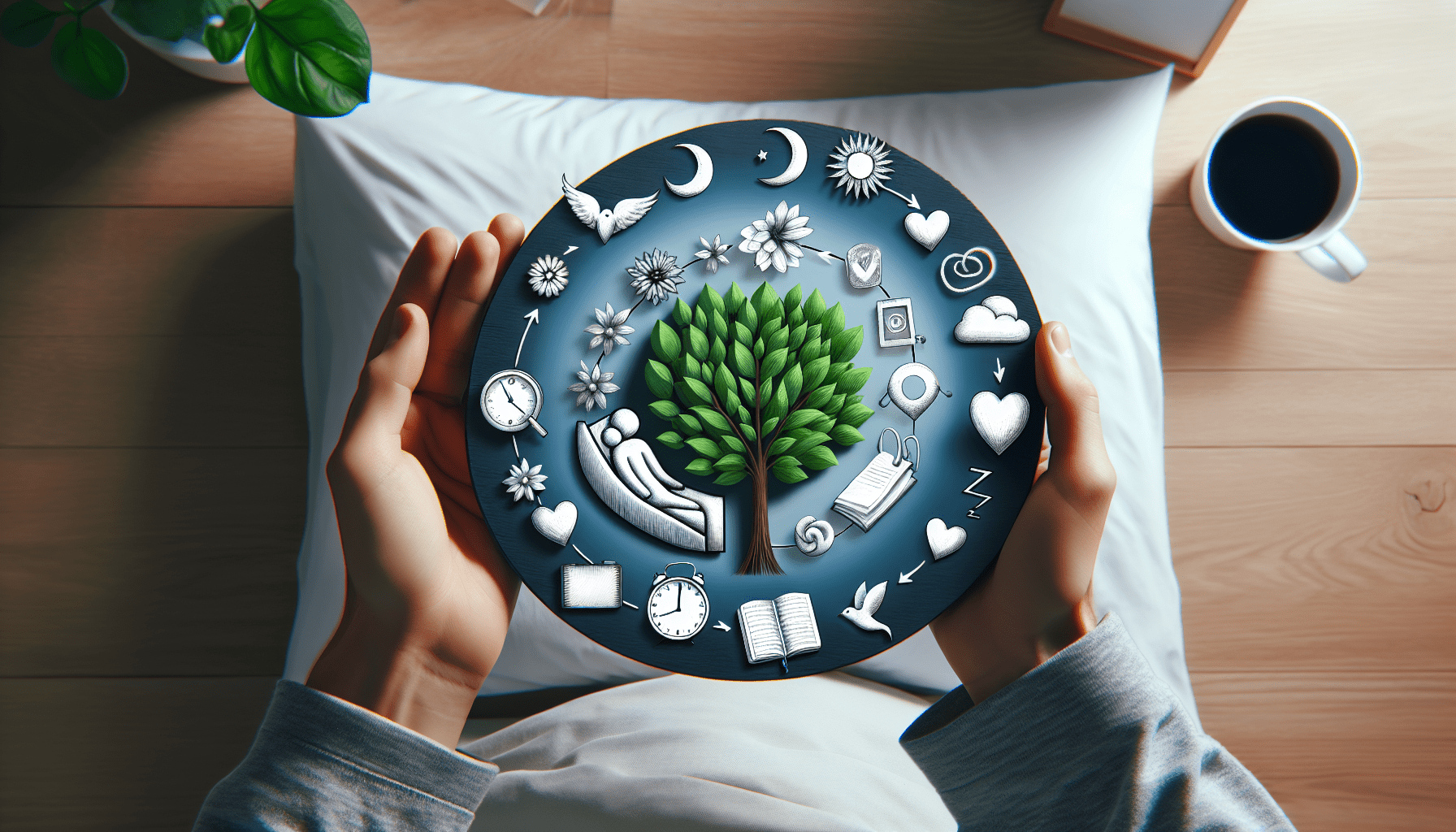Sleep plays a crucial role in supporting a holistic lifestyle, encompassing the mind, body, and spirit. It goes beyond simply taking a rest, as it acts as a foundation for overall well-being. While many may view sleep as a luxury, it is an essential aspect of self-care that cannot be overlooked. From enhancing cognitive functions and boosting memory retention to promoting emotional well-being and facilitating physical recovery, adequate sleep fosters a balanced and harmonious existence. In this article, we will explore the various ways in which sleep contributes to holistic living and how incorporating healthy sleep habits can transform your overall quality of life.

Importance of Sleep
Physical Restoration
Sleep plays a crucial role in the physical restoration of your body. During sleep, your body repairs and rejuvenates itself, allowing for the growth and repair of tissues, the maintenance of hormone levels, and the strengthening of the immune system. It is during this time that your body can heal itself from the wear and tear of daily activities, promoting overall physical health and vitality.
Mental Rejuvenation
Just as sleep is vital for physical restoration, it is also essential for mental rejuvenation. While you sleep, your brain processes the information it has received throughout the day, consolidating memories and knowledge. This helps improve cognitive functioning, enhances learning and memory retention, and promotes mental clarity and creativity. Getting enough sleep allows you to wake up feeling refreshed and recharged, ready to take on the challenges of a new day with a clear mind.
Boosting Resilience
Adequate sleep plays a crucial role in boosting your resilience, both mentally and physically. It strengthens your ability to cope with stressors, improves your mood, and enhances your overall emotional well-being. When you are well-rested, you are better equipped to handle life’s challenges, manage your emotions effectively, and maintain a positive outlook. Sleep deprivation, on the other hand, can leave you feeling irritable, moody, and overwhelmed, making it more difficult to navigate through life’s ups and downs.
Stress Reduction
Sleep is a powerful tool for stress reduction. When you sleep, your body produces lower levels of stress hormones, such as cortisol, while increasing the production of serotonin and other neurotransmitters that promote relaxation and a sense of well-being. By ensuring you get enough sleep, you can reduce your stress levels, improve your mood, and enhance your ability to cope with life’s stressors. In turn, this leads to better overall mental and emotional health, creating a positive impact on your holistic well-being.
Understanding Holistic Living
Definition and Principles
Holistic living is an approach to life that emphasizes the interconnectedness of all aspects of your well-being – physical, mental, emotional, and spiritual. It recognizes that true well-being comes from addressing all these aspects and finding a balance between them. Holistic living involves nurturing your body, mind, and spirit, as well as cultivating positive relationships, pursuing personal growth, and connecting with the world around you. It is an all-encompassing lifestyle that seeks to promote harmony and wholeness in every area of your life.
The Mind-Body Connection
One of the fundamental principles of holistic living is understanding the mind-body connection. This concept recognizes that your mental and emotional states have a significant impact on your physical health and vice versa. When you prioritize your mental and emotional well-being through practices like mindfulness, meditation, and therapy, you can experience improvements in your physical health and vice versa. A healthy mind-body connection is essential for achieving holistic well-being, and sleep plays a vital role in maintaining this connection.
Balancing Different Aspects of Life
Holistic living emphasizes the importance of finding balance in all areas of your life. It involves prioritizing self-care, setting boundaries, and managing your time and energy effectively. By maintaining a balance between work, relationships, leisure activities, and personal growth, you create a harmonious and fulfilling life. Sleep is a vital component of this balance, as it ensures you have the energy and vitality to engage in all aspects of your life fully. It allows you to recharge and rejuvenate, so you have the capacity to show up fully in each area of your life.
Sleep and Holistic Wellbeing
Enhancing Physical Health
Getting enough sleep is essential for maintaining optimal physical health. During sleep, your body repairs and rejuvenates itself, allowing for the healing of tissues, the regulation of hormone levels, and the restoration of energy. Sufficient sleep has been linked to a lower risk of developing chronic conditions such as heart disease, diabetes, and obesity. It also supports healthy immune function, reduces inflammation, and promotes a healthy metabolism. By prioritizing sleep, you can significantly enhance your physical well-being and overall holistic health.
Improving Mental Health
Sleep plays a crucial role in improving your mental health. Adequate sleep can help regulate your mood, reduce the risk of developing mental health disorders such as anxiety and depression, and enhance your overall emotional well-being. When you consistently get enough sleep, you are better able to manage stress, maintain a positive outlook, and regulate your emotions effectively. Additionally, sleep deprivation has been linked to an increased risk of developing mental health issues, so ensuring you prioritize sleep is essential for optimal mental well-being.
Supporting Emotional Balance
Sleep is a powerful tool for supporting emotional balance. When you are well-rested, you are more resilient to stress, better able to manage your emotions, and more in tune with your feelings. Lack of sleep, on the other hand, can lead to increased irritability, mood swings, and difficulty regulating emotions. By giving yourself the gift of sufficient sleep, you lay a solid foundation for emotional balance and well-being, allowing you to navigate life’s challenges with more grace and ease.
Optimizing Sleep for Holistic Living
Establishing a Sleep Routine
Creating a consistent sleep routine is essential for optimizing sleep and supporting holistic living. Going to bed and waking up at the same time every day helps regulate your internal body clock, making it easier to fall asleep and wake up naturally. Establish a relaxing bedtime routine that helps you wind down and prepare for sleep, such as reading a book, practicing relaxation techniques, or taking a warm bath. By following a consistent sleep routine, you can improve the quality and duration of your sleep, contributing to your overall holistic well-being.
Creating a Sleep-Conducive Environment
The environment in which you sleep can significantly impact the quality of your sleep. Ensure your bedroom is a sanctuary of calm and relaxation, free from distractions and sources of stress. Make sure your room is cool, dark, and quiet, and invest in a comfortable mattress and pillows that support your body. Remove electronic devices from your bedroom, as the blue light emitted by screens can interfere with your natural sleep-wake cycle. By creating a sleep-conducive environment, you can optimize your sleep and enhance your overall well-being.
Adopting Relaxation Techniques
Incorporating relaxation techniques into your bedtime routine can be incredibly beneficial for promoting quality sleep and supporting holistic living. Practices such as deep breathing, meditation, and mindfulness can help calm your mind, reduce stress, and prepare your body for sleep. Experiment with different techniques to find what works best for you and integrate them into your evening routine. By adopting relaxation techniques, you can enhance the quality of your sleep and promote a greater sense of overall well-being.
Managing Sleep Disorders
If you struggle with sleep disorders such as insomnia or sleep apnea, it is essential to seek professional help to manage these conditions. Sleep disorders can significantly impact your sleep quality and overall well-being, so it is crucial to address them with the appropriate treatment and support. Consult with a healthcare professional who specializes in sleep medicine to determine the best course of action for managing your sleep disorder. By seeking treatment, you can optimize your sleep and support your holistic well-being.

Holistic Approaches to Sleep
Ayurveda and Sleep
Ayurveda, an ancient Indian system of medicine, offers holistic approaches to sleep that focus on balancing the body and mind. Ayurveda recognizes that each individual has a unique constitution and offers personalized recommendations for improving sleep based on one’s Dosha (body type). Ayurvedic practices such as following a balanced diet, practicing relaxation techniques like meditation and yoga, and using herbal remedies can promote restful sleep and support overall holistic well-being.
Traditional Chinese Medicine and Sleep
Traditional Chinese Medicine (TCM) views sleep disturbances as imbalances in the body’s energy flow. TCM approaches to sleep focus on restoring balance and harmony by addressing the underlying causes of sleep problems. Acupuncture, herbal medicine, and lifestyle modifications are commonly used in TCM to promote better sleep quality. TCM principles emphasize the importance of maintaining a healthy lifestyle, managing stress, and fostering balance in all aspects of life to support holistic sleep and overall well-being.
Herbal Remedies for Sleep
Herbal remedies have been used for centuries to promote restful sleep and support holistic well-being. Herbs such as chamomile, lavender, valerian root, and passionflower have soothing properties that can help calm the mind, relax the body, and promote sleep. These herbs can be consumed in the form of teas, tinctures, or supplements. However, it is important to consult with a healthcare professional before incorporating herbal remedies into your sleep routine to ensure they are safe and appropriate for your individual needs.
Nutrition for Better Sleep
Foods that Promote Sleep
Nutrition plays a significant role in sleep quality. Certain foods contain compounds that can promote relaxation, aid in the production of sleep-inducing hormones, and regulate the sleep-wake cycle. Foods rich in tryptophan, magnesium, and vitamins B6 and C, such as turkey, nuts, seeds, bananas, and kiwi, can support better sleep. Additionally, incorporating complex carbohydrates like whole grains and lean proteins into your evening meals can help maintain stable blood sugar levels throughout the night, preventing disturbances in sleep. By making conscious food choices, you can optimize your sleep and support your holistic well-being.
The Role of Hydration
Hydration is an often-overlooked aspect of sleep hygiene. Dehydration can cause discomfort and disrupt sleep. Ensure you are adequately hydrated throughout the day by drinking water and consuming hydrating foods like fruits and vegetables. However, be mindful not to drink excessive fluids too close to bedtime to minimize the likelihood of sleep disruptions from frequent awakenings to use the bathroom. By maintaining proper hydration, you support your body’s physiological functions, including quality sleep.
Avoiding Sleep-Disrupting Substances
Certain substances can interfere with sleep quality and should be avoided, especially close to bedtime. Stimulants such as caffeine and nicotine can disrupt sleep by increasing alertness and delaying the onset of sleep. Alcohol, though it may initially make you feel drowsy, can interfere with the quality of your sleep and lead to disruptions throughout the night. It is important to limit or avoid the consumption of these substances, particularly in the hours leading up to bedtime, to ensure that your sleep remains restful and supportive of your overall holistic well-being.
Physical Activity and Sleep
Exercise and Quality of Sleep
Regular physical activity has been shown to improve sleep quality and duration. Engaging in moderate-intensity aerobic exercise, such as brisk walking or cycling, for at least 30 minutes most days of the week can help promote more restful sleep. Exercise helps reduce anxiety and stress levels, improves mood, and increases the production of endorphins, which can contribute to better sleep. However, it is important to avoid vigorous exercise close to bedtime, as it can increase alertness and make it more challenging to fall asleep. By incorporating regular exercise into your routine, you can support healthy sleep and overall holistic well-being.
Yoga and Sleep
Yoga, an ancient practice that combines physical postures, breath control, and meditation, can be beneficial for promoting better sleep. The gentle movements and deep breathing in yoga can help relax the body and calm the mind, preparing you for bedtime. Restorative yoga poses, such as Legs-Up-The-Wall and Child’s Pose, can be particularly helpful for winding down and releasing tension before sleep. Integrating a regular yoga practice into your routine can help you establish a sense of peace and relaxation, contributing to improved sleep quality and overall holistic well-being.
Sleep and Relationships
Promoting Healthy Sleep Patterns as a Couple
Sleeping well as a couple can have a significant impact on the quality of your relationship. It is important to communicate openly about your individual sleep needs and find a sleep routine that works for both partners. Consider factors such as preferred sleep schedules, bedtime routines, and sleep environment preferences. Prioritize creating a sleep-conducive environment that promotes restful sleep for both partners. By promoting healthy sleep patterns as a couple, you can ensure that both individuals feel well-rested and supported in their holistic well-being, fostering a deeper connection and harmony in the relationship.
Co-Sleeping and its Effects
Co-sleeping, or sharing a bed with a partner or child, is a practice that is prevalent in many cultures. While co-sleeping can promote feelings of closeness and intimacy, it can also have implications for sleep quality. It is important to consider individual preferences and needs when deciding whether to co-sleep. Some individuals find co-sleeping comforting and supportive of their holistic well-being, while others may experience sleep disturbances or difficulties. Open communication and finding a balance that works for both partners and respects individual sleep needs is crucial for maintaining healthy sleep patterns and overall relationship well-being.
Sleep and Parenting
Parents often face unique sleep challenges due to the demands of caring for young children. It is important for parents to prioritize their own sleep to ensure they have the energy and well-being to care for their children effectively. Establishing consistent sleep routines for children can help support their development of healthy sleep habits. Additionally, parents can take turns in sharing nighttime responsibilities to ensure each parent has the opportunity for quality sleep. By recognizing the importance of sleep in parenting and finding strategies to support both child and parental sleep, parents can optimize their holistic well-being and provide a nurturing environment for their children.
Cultural Variations in Sleep Patterns
Diverse Sleep Practices Across Cultures
Sleep practices vary across different cultures, reflecting unique cultural beliefs, values, and traditions. Some cultures may prioritize napping during the day, while others may have specific rituals or practices to prepare for sleep. Understanding and respecting these cultural variations can promote cultural diversity and inclusivity. It also highlights the importance of recognizing the impact of cultural factors on sleep and holistic well-being, emphasizing the need for individualized approaches to sleep that respect cultural preferences and practices.
Sleep Rituals and Traditions
Many cultures have specific sleep rituals and traditions that are deeply rooted in their cultural heritage. These rituals often involve practices such as bedtime prayers, meditation, or relaxation techniques specific to that culture. Sleep rituals serve to create a sense of calm, promote relaxation, and prepare the mind and body for sleep. By incorporating these rituals and traditions into your own sleep routine, you can honor your cultural background and enhance your overall holistic well-being.
Sleep and Work-Life Balance
Maintaining Boundary Between Work and Sleep
Maintaining a clear boundary between work and sleep is essential for achieving work-life balance and supporting holistic well-being. Establishing a regular sleep schedule and sticking to it can help create a clear boundary between work and rest. Avoid bringing work-related devices or tasks into the bedroom, as this can disrupt the natural separation between work and sleep. By prioritizing restful sleep and creating boundaries around work, you can ensure that your sleep remains restorative and supportive of your overall well-being.
Shift Work and Sleep Challenges
Shift work, or working non-traditional hours such as night shifts or rotating shifts, can present significant challenges to sleep and overall well-being. Irregular work schedules can disrupt the natural sleep-wake cycle, making it difficult to establish consistent sleep patterns. It is important for shift workers to prioritize their sleep by creating a sleep routine that aligns with their work schedule, optimizing their sleep environment for restful sleep, and seeking support from healthcare professionals or sleep specialists if necessary. By finding strategies to navigate the unique sleep challenges of shift work, individuals can support their holistic well-being and maintain work-life balance.
In conclusion, sleep plays a critical role in holistic living. It supports physical restoration, mental rejuvenation, and resilience. By prioritizing sleep, you can enhance your physical health, improve your mental well-being, and support emotional balance. Optimizing sleep for holistic living involves establishing a sleep routine, creating a sleep-conducive environment, adopting relaxation techniques, and managing sleep disorders. Holistic approaches such as Ayurveda, Traditional Chinese Medicine, herbal remedies, and incorporating nutrition, physical activity, and conscious sleep practices can further enhance the benefits of sleep. Additionally, sleep impacts relationships, cultural practices, and work-life balance, highlighting the interconnectedness between sleep and overall holistic well-being. By recognizing the importance of sleep and implementing strategies to optimize it, you can support your holistic well-being and lead a more balanced and fulfilling life.

